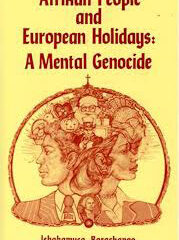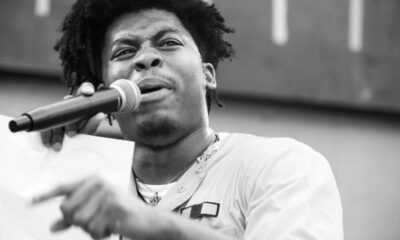Events
A Young Thought Leader Speaks: Youthfest 2k23 and The Struggle for Independent Afrikan Educational Institutions
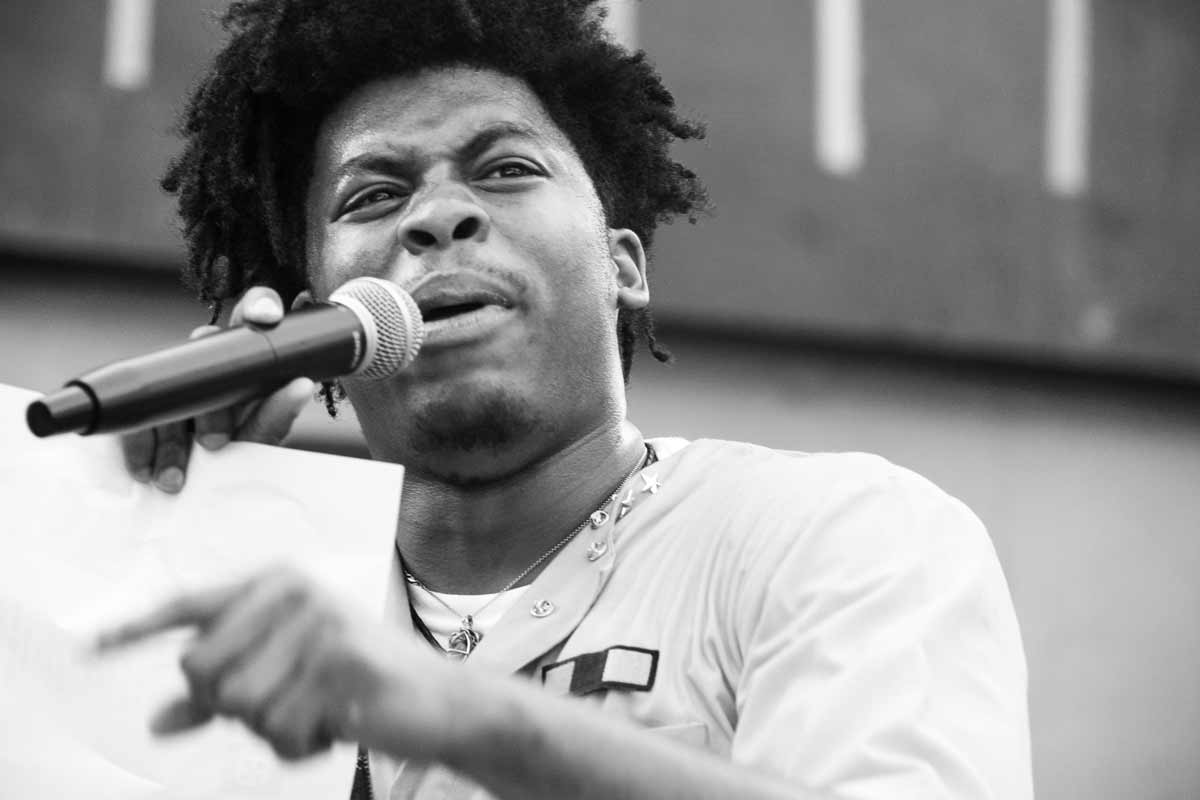
By Nehemi’EL Ibrihim-Simms
The 2nd Annual Youthfest dedicated to increasing awareness of The Struggle for Independent African Education (SIAE or “The Struggle”) took place Sunday, October 1st in Herbert Von King Park as a day of celebration.
Young people from middle schools and home schools from all over New York City came together with their families to showcase their talents, their power, their promise, and their commitment to supporting and building strong Afrikan communities.
Among the community organizations represented at the event were: Operation P.O.W.E.R., How Our Lives Link Altogether, the International People’s Democratic Uhuru Movement, the Ankhsgiving Collective, Brownsville Connections, and the Xyayx Institute. Joined by an audience of hundreds in the Harriet Coursey amphitheater throughout the day, they all assembled in solidarity to support a current fundraising effort for The Struggle for Independent African Education.
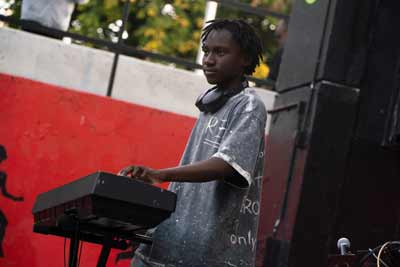

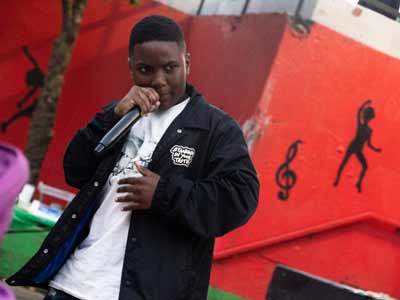
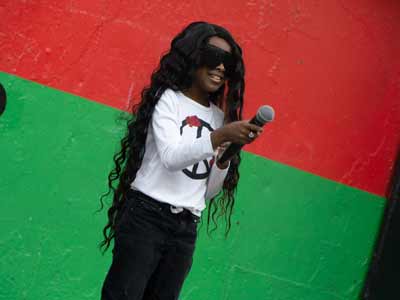


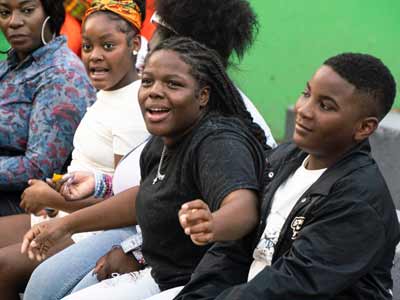

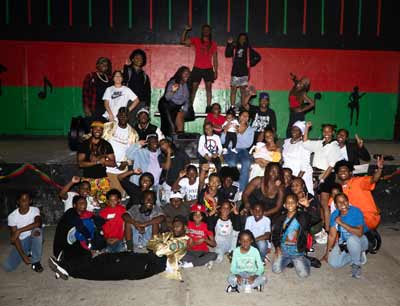
The goal is to raise money for six independent African educational institutions and encourage those institutions to create a Mutual Aid Developmental Agenda for Collective Relief.
Towards that end, for the past 33 weeks, a contingent of New York City-based campaign organizers have carried the slogan “$10 from 5,000 African people” throughout Crown Heights, Brownsville, and Harlem, while picking up trash in their neighborhoods.
So far, the campaign has won the support of consequential organizations like the Association for the Study of Classical African Civilizations (ASCAC) and the National African American Empowerment Association (NAAEA) as well as local community organizations like the Brooklyn Combine.
At the October 1 event, inspirational speakers, rappers, dancers, musicians, and organizers roused the attendees; shared updates about their grassroots activities; and affirmed their support. A featured speaker was the dynamic Bro. John Muhammad, founder of the youth mentorship organization, Going After the Next Generation – whose remarks underscored the self-empowerment messages.
Bro. John said the Struggle for Independent African Educational Institutions places the onus of community mobilization into the hands of young African students in New York City. Bro. John and other speakers also applauded the audience of all ages in Von King Park, that day, for recognizing the relationship between the underdevelopment of African communities and the
prevailing disorganized systems of education socialization.
To sustain the momentum, students and families in Brooklyn and Harlem are outside every Sunday to activate the message. We pick up trash from the streets as we distribute healthy messages and significant information about the existence and needs of Independent African Educational Institutions.
We have identified miseducation, mass incarceration, gentrification, police genocide, and inaccessibility to wealth as the major problems facing Africans living in the Americas.
The facts are, we explain to them, New York City’s traditional K-12 system does not prepare young African people to be young African people, nor does it teach young African people how to be productive citizens of this country; the traditional schools do not prepare us for taxes, how to deal with banks, how to become entrepreneurs nor how to sustain an enterprise, or anything concerning finances.
When I speak about this, I speak from my own experience: the system does. I know that the system does not value — nor does it have a desire to equip me with — African culture and wisdom.
The school I attended in New York City did not “deal with” African culture within the context of its curriculum or through its facilitating methodology. These are things that, over time, I realize are increasingly important and relevant to my life. As an African person in this country, I was fortunate to have had a non-traditional upbringing: I was in a safer place than most when I went home, and I was blessed to have developed some semblance of identity that has allowed me to navigate this society. The same is not true for many young Africans.
Since Covid, we have seen a rise in the willingness of African parents to homeschool their children. We also have seen a resurgence of white nationalistic terrorism and anti-African attacks from mass shootings to police killings and regressive legislature in Florida.
Some Black People have responded to this insanity by reclaiming sovereignty over their children’s socialization and by setting up homeschooling collectives that give parents more control over what their children are learning. I believe homeschooling is the future of education. There’s a correlation between that form of teaching and the self-determination of African people in making our institutions central to our lives and the lives of our communities.
Young African Students have identified six Independent African Educational Institutions, in four cities on the East Coast that have a significant population of African people. We are calling on 5,000 Africans to pool $10, each, as a donation, and redistribute these funds to the institutions within a proposed Mutual Aid Developmental Agenda (MADA).
The Xyayx Institute (Brooklyn, New York)
How Our Lives Link Altogether 24-month program (Harlem, New York)
The Frederick Douglas Marcus Garvey Academy (Wilmington, Delaware)
Nationhouse (Washington D.C.)
Kimoyo Shule Africana (Baltimore, Maryland)
The Tendea Family Cadet Program (Baltimore, Maryland)
(The Mutual Aid Development Agenda is essentially a pact signed by the leadership of the above institutions that will outline how they will work to share resources and develop together.)
Students involved in The Struggle are committed to maintaining a stance of Direct Positive Action and decentralization based on the stipulation that change will occur in their neighborhoods because of their direct interaction with the people who live in their neighborhoods.
Direct Positive Action holds that the energy needed to change the African community lies in the progressive tendencies of the African community.
Community cleanup is simple, but it is a powerful, positive strategic tactic that promotes the goals and objectives of The Struggle and illustrates our solidarity with one another. Youth in The Struggle recognizes the plurality of community cleanups as a civic tool in that it combats gentrification and the painfully clear public health disparities that disproportionately impact predominantly African neighborhoods.
Our interactions within the neighborhoods where we live have revealed to us that Power lies dormant in our own neighborhoods, our own families, and our own selves.
As we outreach and spread the message of our involvement, we are reaffirming that voice inside of us that says, “I will have a say in what direction our community will move.”
By playing an active role in determining our present as well as our future, we are encouraged to look at our existence systematically and purposefully because what we do now will ultimately impact future generations.
Since Youthfest 2k22 of September 24, 2022, the confederation of students has raised $1,500 and gathered 200 signatures of Africans who are in support of the Mutual Aid Developmental Agenda which is the goal of the Struggle for Independent African Educational Institutions.
We are issuing a call to action to all progressive organizations, concerned parents, and most importantly, Young African Students to join this Struggle!
For more information, including a progress report on our efforts, please email youthcleanupcommittee@gmail.com. Donations are accepted towards our goal through cashapp $youthcleanup!
Nehemi’EL Ibrihim-Simms is a 24-year-old Pan-Africanist activist-educator, and founder of Basimah’s Hands Tutoring whose work primarily centers around facilitating the integration of independent African institutional systems will be given voice in his next publication “A Treatise on the Modern Application of African Political Philosophy.”


